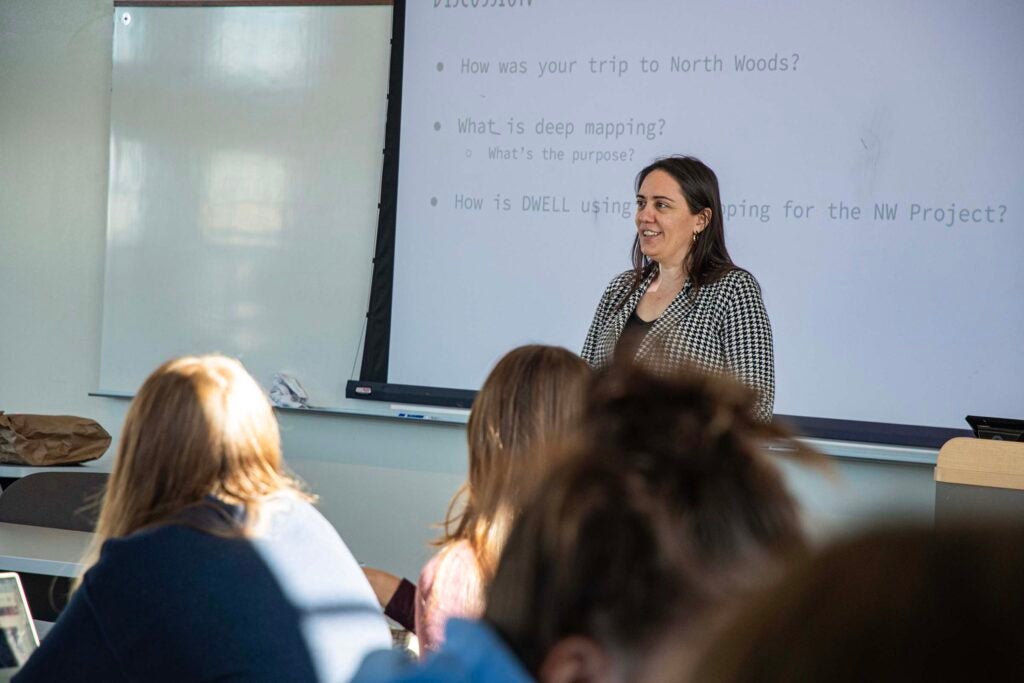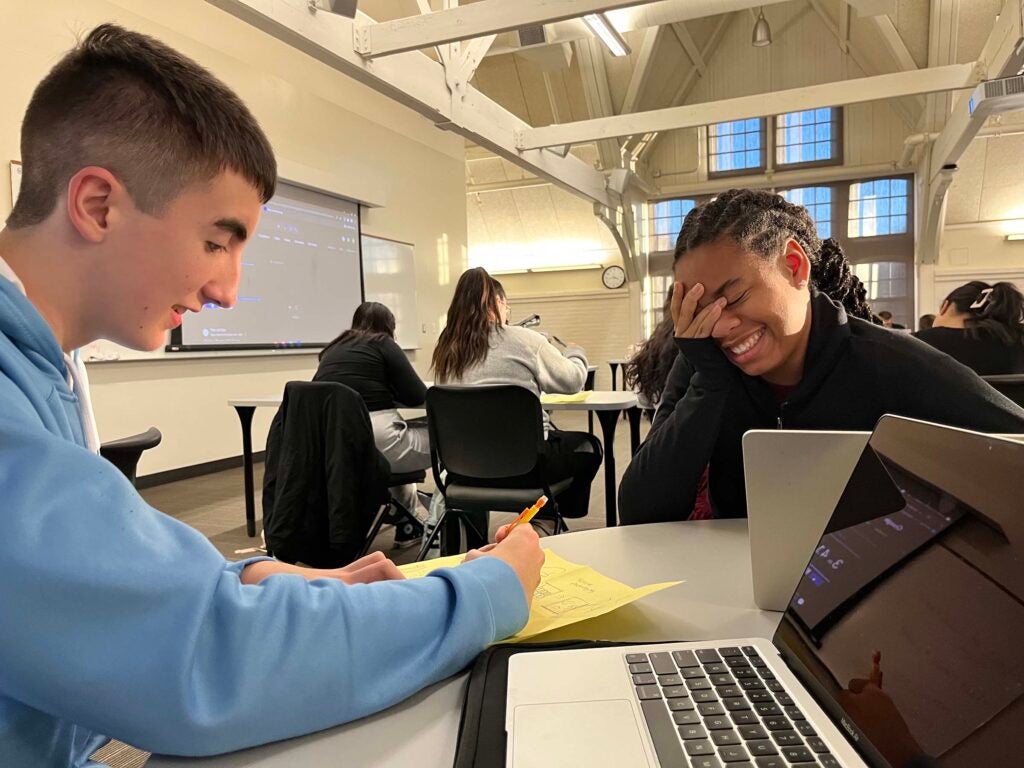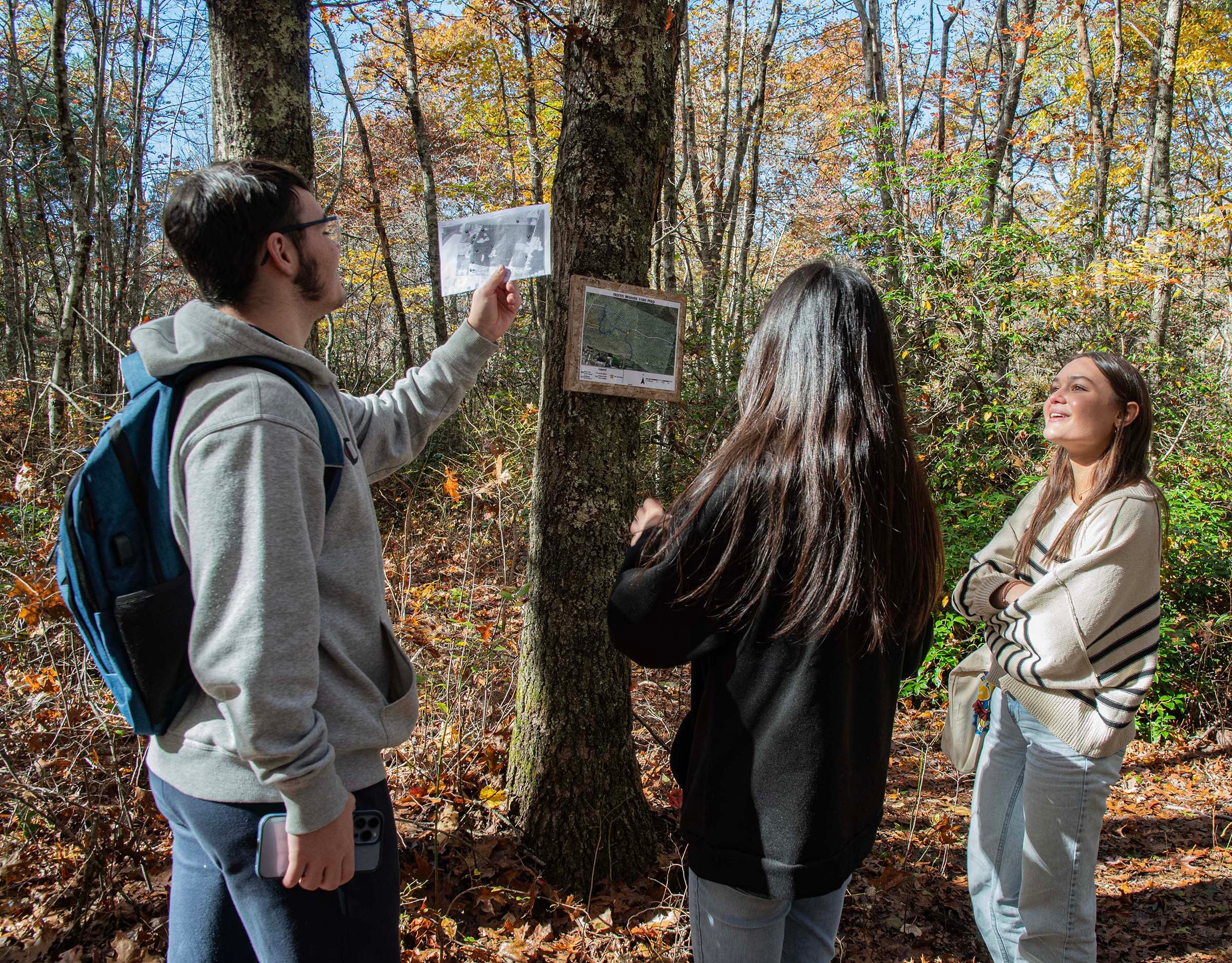KINGSTON, R.I. – Dec. 20, 2023 – A group of University of Rhode Island honors students was sent out this fall to explore the North Woods near campus. The exercise was part of a new class at URI helping incoming honors students at the University better understand their new community, starting with their immediate surroundings. The initial woods foray will eventually lead them to connect local issues to complex global issues. The inaugural Planet Honors class just completed its initial section this fall and will be offered again in the spring.
While the students have been wayfinding around URI this fall, URI’s Honors Program, as a whole, has been moving in new directions, too.

The Honors Program at URI began in the late 1950s. In the years since, its hallmark program, the Honors Colloquium, has played an important role in the intellectual life of URI and the state, welcoming scholars and leading experts from all over the world, from Coretta Scott King and Pete Seeger, to Christopher Reeve and Jane Goodall, and more recently, Chef Sean Sherman and ocean advocate Wallace Nichols.
Local problems, global impact
Coming out of a COVID-19 high school experience, the Class of 2027 knows all too well that world events can affect their lives on a very personal level.

The class Planet Honors is a first stop for many of them to transition from seeing themselves as inheritors of issues, to problem solvers for change.
“This honors onboarding course puts students to work as creative thinkers,” says Karl Aspelund, associate director of the Honors Program, who sketched the direction for the new course.
Creative thinking in action
This fall, students in HPR124 (Planet Honors) gathered on the third floor of Lippitt Hall for an exercise guided by instructor and course co-creator Cynthia Taylor, examining the issue of microplastics in Narragansett Bay.
Right away, the students went into idea mode. They gamely tackled the topic, mapping causes and generating solutions.

Evelynne Lepe, a music major from California, first heard about URI honors at orientation. “I liked how the program was able to get people involved with topics outside the classroom and wanted to take part in that journey,” she recalls. She says that honors has helped her become more involved outside her major.
“I am looking forward to the greater opportunities for projects in the Honors Program that affect greater good,” Lepe says. “I like that we work with real problems and would definitely recommend honors to other students.”
Students found a class project on food waste / food insecurity particularly eye-opening.
“Before this project, I was unaware of how much food we throw away,” says Lepe. “The class project has personally impacted me. When I see food going to waste now, part of me feels responsible to help it not become a greater issue.”
Taylor’s unique background has prepared her well to teach Lepe and others in a class like this. A sociology and anthropology lecturer who’s worked as a science educator, Taylor brings interdisciplinary training in biology and STEM education, and expertise in the social dimensions of scientific knowledge, public engagement with science, and inclusive science communication. She received a URI Teaching Excellence Award in 2023 and is part of the first cohort of RISE-UP Innovation & Entrepreneurship Faculty Fellows in 401 Tech Bridge.
The students enjoyed the activity she ran, even if the topic was a worrisome one.
Brady McNamara, a mechanical engineering major from West Warwick, says the exercise is pressured but fun. “I like the focus on innovating and sharing,” he says. His partner Lauren Schleifer (marine biology, Easton, Massachusetts) likes the collaborative problem-solving approach in honors, too. They make scientific problem-solving look fun.
The class also serves as a community builder; many of these students will revolve in and out of future classes together if they stay in the Honors Program.
“We want to cultivate interest in deep thinking here,” Taylor says. “This course is for changemaking, helping students hear from and connect with experts in our community, helping them get engaged in issues at URI and beyond.”
“We want to cultivate collaboration,” Honors Program Director Karen de Bruin adds. “These are depressing issues we’re examining. The point is not to scare students, but to empower students with hope and the basic tools they need to be changemakers in the world.”
A scholar of Revolutionary France, de Bruin says that every phase of human history has had humans confronting their own demise and problems. She and her team hope to see honors students tackle the pressing issues of our time, as college students everywhere face unparalleled challenges upon graduation.
To help chart its new course, the program is getting feedback from the National Collegiate Honors Council. A recent analysis of URI’s Honors Program by the national honors organization cited several strengths in URI’s program, calling the Honors Colloquium a “crown jewel” of the University, along with the Office of National Fellowships and Academic Opportunities, which helps URI’s top students secure successful opportunities (to the tune of more than $1.2 million last year). The council also pointed to URI’s location as key to many opportunities in New England. (Learn more about the study and its feedback in last year’s Honors Program annual report.)
During the past 15 years, the program has grown tremendously in terms of incoming honors-eligible students as the University’s academic profile has grown. Its aim is to give these students additional skills, to leave the University with an activist mindset: one focused on community and world, connecting students across the University for broad impact beyond it.
It’s a direction in which the Honors Program has been trending; recent colloquiums have focused on equitable food systems, shoreline sustainability and disability in the 21st century.
Seray Ergene, an assistant professor of management and a Coastal Institute Senior Fellow, worked with the Honors Program for the first time this year as a co-coordinator for the fall colloquium on ‘Business for the Common Good.’
“I had a rewarding experience as a junior faculty teaching the Honors Colloquium course this fall,” she says, “and was amazed at the highly motivated students from all disciplines genuinely engaging with some of the most difficult but important conversations of our times, such as climate change, systemic racism, and gender inequalities. These socio-ecological problems are overwhelming, but the Honors Program creates a welcoming and meaningful space for students to explore them.”
“Honors is a place to effect change,” says de Bruin. “We have a lot of pockets of incredible research here and honors can bring this scholarship together to benefit the students. Honors students are creative thinkers and problem solvers. Their innate curiosity is something the world needs and we want to cultivate that here, giving students a problem-solving tool kit they can take out into the community to be part of solutions.”
The program will function like a think tank or idea incubator with students well-versed in issues.
Lepe is new to it all, to the history and to the future directions, but she’s on board already.
“This course has helped me see myself as a changemaker at URI,” she says. “The Honors Program has helped me gain more knowledge of issues around the planet, and how I can impact those problems.”
Aspelund comments, “We want to examine pressing issues on a broad scale and connect URI students to that, regardless of major or program. The URI Colloquium has always done that. We are now formally expressing something that the Honors Program has always done.
“We are looking for students who are willing to be changemakers, who are solution-oriented,” he says. “If you are, Planet Honors is the place for you.”

